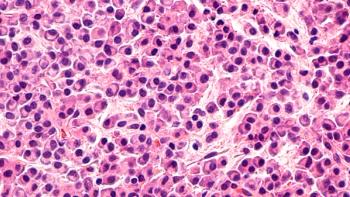
“These findings suggest that similar to its benefits in ovarian cancer, NACT could potentially lower perioperative morbidity and may serve as an important treatment option among women with metastatic endometrial cancer,” the study authors wrote.

Your AI-Trained Oncology Knowledge Connection!


“These findings suggest that similar to its benefits in ovarian cancer, NACT could potentially lower perioperative morbidity and may serve as an important treatment option among women with metastatic endometrial cancer,” the study authors wrote.

This study indicated that appendiceal cancer diagnosed among younger individuals harbors a distinct genomic landscape, as compared with appendiceal cancer diagnosed among older individuals.

The phase 2 HORIZON study indicated that melflufen plus dexamethasone (Ozurdex) demonstrated clinically meaningful efficacy as well as a manageable safety profile in patients with heavily pretreated relapsed/refractory multiple myeloma.

Given the limited success and potential harms associated with pharmacological interventions, the researchers suggested that nonpharmacological interventions such as those identified in the study should be considered as first-line treatment options for managing breathlessness.

This study found that among patients with lung cancer from Latin America, Native American ancestry was associated with increased mutations in the EGFR gene, independent of smoking status.

“In the long-term, active surveillance is a safe and viable option for men with low-risk and carefully selected intermediate-risk prostate cancer,” the study authors wrote.

This new risk estimation model could help physicians determine whether an average risk patient’s specific risk indicates an at-home stool test would be a good screening option or suggests a colonoscopy may be the most appropriate option.

Based on the recommendation of an independent data monitoring committee, Astellas has halted enrollment in the trial and is reviewing the results for further actions needed.

Though these collective findings demonstrate that genetic predisposition to increased weight is protective against breast and prostate cancer, further research is still necessary to work out exactly how this protection is provided, especially in breast cancer.

Digital breast tomosynthesis plus synthetic mammography depicted more cancers and found a lower number of stage II cancers at repeat screening compared with FFDM.

Full approval has been granted by the FDA to osimertinib (Tagrisso) for use as adjuvant therapy following tumor resection among patients with non–small cell lung cancer whose tumors have EGFR exon 19 deletions or exon 21 L858R mutations.

The expert in urologic oncology spoke about the advancements made in 2020, as well as areas of prostate cancer care which he believes remain to be improved.

Relugolix (Orgovyx) is the first oral drug in its class to receive FDA approval for the treatment of adults with advanced prostate cancer.

Selinexor (Xpovio) earned full FDA approval in combination with bortezomib (Velcade) and dexamethasone for the treatment of multiple myeloma after 1 or more prior therapies based on the phase 3 BOSTON trial.

A new rituximab biosimilar from Amgen is now FDA approved, providing more treatment options to patients with certain hematologic cancers.

Investigators suggested that these study results reveal a need to protect and monitor patients with cancer as part of the strategy to control the COVID-19 pandemic.

The FDA granted priority review to a new supplemental biologics license application for pembrolizumab (Keytruda) in combination with chemotherapy for the first-line treatment of patients with locally advanced unresectable or metastatic esophageal and gastroesophageal junction cancer.

The FDA approved margetuximab-cmkb (Margenza) in combination with chemotherapy for the treatment of adult patients with metastatic HER2-positive breast cancer who have received 2 or more prior anti-HER2 regimens, at least 1 of which was for metastatic disease.

This study demonstrated that the concurrent use of this new artificial intelligence tool alongside mammography improved the diagnostic performance of radiologists in the detection of breast cancer without prolonging their workflow.

The pivotal phase 3 KEYNOTE-775/Study 309 trial evaluating the investigational use of pembrolizumab (Keytruda) plus lenvatinib (Lenvima) met its dual primary end points of overall and progression-free survival in patients with advanced endometrial cancer.

In our lung cancer quiz, you’ll get to test your knowledge on the BFAST study.

This study revealed that reliability, or patient interpretation of telemedicine as a substitute for in-person visits, of the platform was of the greatest concern to all patients.

The agent was designed as an orphan drug for the treatment of pancreatic cancer, acute myeloid leukemia, myelodysplastic syndrome, peripheral T-cell lymphoma, Burkitt’s lymphoma, and soft tissue sarcoma.

Payne and colleagues indicated that a significant number of adolescent and young adult women are still not being given the information they desire regarding fertility preservation and therefore are not making fully informed treatment decisions.

In our colorectal cancer quiz, you’ll get to test your knowledge on mismatch-repair deficiency in patients with colorectal cancer and the results of the KEYNOTE-177 trial.

The American Lung Association’s annual “State of Lung Cancer” (SOLC) report tracked the toll of lung cancer at national and state levels, identifying both promising improvements for the overall population and significant health disparities for racial and ethnic minorities.

The founder and CEO of Sema4 spoke about what health care providers currently lack in preventing and treating diseases and what the reality of early detection and disease prevention can provide to patients with cancer.

The FDA granted breakthrough therapy designation to sotorasib for the treatment of patients with locally advanced or metastatic non-small cell lung cancer with KRAS G12C mutation, as determined by an FDA-approved test, following at least 1 prior systemic therapy.

The FDA has granted accelerated approval to pembrolizumab (Keytruda) in combination with chemotherapy for the treatment of patients with locally recurrent unresectable or metastatic triple-negative breast cancer (TNBC) whose tumors express PD-L1 (combined positive score [CPS] ≥10) as determined by an FDA approved test.

The FDA placed a clinical hold on patient enrollment and dosing for the ongoing phase 1/2 dose-escalation clinical trial evaluating BPX-601 in patients with previously treated metastatic pancreatic or prostate cancer.